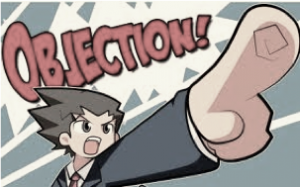Audio clip: Adobe Flash Player (version 9 or above) is required to play this audio clip. Download the latest version here. You also need to have JavaScript enabled in your browser.
I pull back the curtain on the laws relating to OBJECTIONS and SIDEBAR CONFERENCES. The law allows both sides in a criminal or civil case to object to certain questions or answers that are being asked or elicited in open court. There are Rules of Evidence that govern what the jurors can and cannot hear. When one side feel the other is violating those rules, an objection is posed. If the objection is “overruled” that means that the Court is disagreeing with the side making the objection and the judge will allow the question or the answer to stand. If the objection is “sustained” that means that the Court is agreeing with the party making the objection and the question will not be allowed or the answer (if already given) will be struck from the record.
Sidebar conferences occur at the discretion of the court. The judge can order the parties to “approach the bench” to discuss a matter to be heard outside the presence of the jurors and the lawyers can also request a “sidebar” to argue a point of law. Many times the sidebars are for the purpose of arguing legal issues that the jurors cannot be privy to, but just as often they are for the more mundane purposes of scheduling or requesting bathroom breaks.
TRIAL LAWYER MENTOR Quick Tip:
Quick Tip for giving your audience an “insider’s” secret that will help make your presentations more compelling and your message more memorable.
LAWYERS and LAW STUDENTS:
Click here to sign up for our free newsletter where I share in depth tips and strategies for mastering the Art of the Jury Trial. And be sure to check back soon for a special offer exclusively for attorneys!
Download AUDIO here (MP3)
